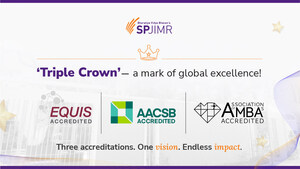MUMBAI, India, Dec. 7, 2022 /PRNewswire/ -- S. P. Jain Institute of Management and Research (SPJIMR) hosted AACSB International's Societal Impact Seminar on December 2, 2022, at its Mumbai campus. The highly interactive seminar was conducted by Geoff Perry, Executive Vice President, Global Chief Membership Offices and Manager Director, Asia Pacific AACSB, and Amy Memon, Regional Head, South Asia, AACSBI. It was attended by over 25 representatives from leading management and technology institutes across India, committed to creating positive societal impact and action.
AACSB facilitator Amy Memon elaborated that the goal of the event was to convene high-quality business schools and give them an opportunity to examine their mission activities, as well as the impact they are having on learners, business, and society. Then, guided by the AACSB business accreditation standards, participants reflected on how they can focus their efforts to achieve a deeper positive societal impact.
AACSB facilitator Geoff Perry explained AACSB's philosophy and emphasised that the real purpose of higher education, of business schools, is to make a difference.
In his opening address, SPJIMR Dean Dr. Varun Nagaraj emphasised that for a management institute, its participants are not its customers but its product, like its research output is a product or its outreach is a product and said, "We need to look at business schools as a portfolio of products that create impact in different ways aligned to balance the society, environment, and economy."
The engaging seminar facilitated discussions and presented new insights and frameworks, enabling participants to identify each AACSB accreditation standard that incorporates societal impact.
Key takeaways of the seminar:
- The real purpose of business schools is to create impact, and business education plays a pivotal role in instilling in students a societal impact mindset that places people over profit.
- Globally, business schools continue to advance societal impact initiatives through their missions, curriculum, intellectual contributions, and new innovative activities.
- Business schools need to demonstrate commitment to the societal impact that goes beyond the measurement methods and metrics typically associated with accreditation.
Summary of participant takeaways:
- Towards the conclusion of the session, most participants echoed the sentiment that the session encouraged them to engage with embedding societal impact as an integral part of their business school's strategy and focus areas.
- The session's collaborative activities helped them understand how to create micro-plans, resource deployment, and goals for their school's focus areas.
- Business schools are expected to progress beyond a list of service activities as this is not what is intended in the accreditation standards. The work schools do in the societal impact space should be strategically connected to an area of focus that is chosen by the school.
SPJIMR's Societal Impact:
- Since its inception in 1981, SPJIMR's mission has been unchanged: to 'influence practice and promote value-based growth' of students, alumni, organisations and their leaders, and society at large. SPJIMR aims to do this by Advancing Wise Innovation at scale through its teaching, thought leadership, industry, and community engagement.
- SPJIMR is recognised for its pioneering initiatives, Abhyudaya and DoCC, through which it promotes innovative community-based actions, environmentally and socially responsible culture and governance with a strong teaching focus on responsible leadership.
- SPJIMR was conferred with the Innovative Practices Award 2018 by the United Nations Global Compact Network India (GCNI) for two of SPJIMR's initiatives, Abhyudaya and DoCC, which address two Sustainable Development Goals, quality education, and partnership for the goals.
- SPJIMR is one of only four management schools across 21 participating countries to be awarded the highest 'pioneering school' rating in the Positive Impact Rating of 2022. 'Pioneering schools' were described as those with 'unique, sustaining global leadership progress in all impact dimensions'. This validates the work SPJIMR has done over the last two decades in embedding social sensitivity as part of its curriculum and cultivating a sustainability mindset among the students.
For More Information, Please Contact:
Pali Shukla
[email protected]
022-61454200
Logo: https://mma.prnewswire.com/media/1535594/SPJIMR_Logo.jpg






Share this article